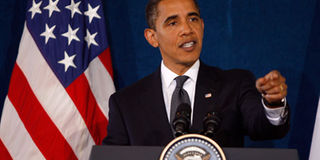Obama issues stark warning on US economy

Facing a tough reelection fight, President Barack Obama warned Europe's crisis could severely impact the fragile US recovery if Republicans balk at passing his $447 billion job creation plan October 6, 2011. AFP
Facing a tough reelection fight, President Barack Obama warned Europe's crisis could severely impact the fragile US recovery if Republicans balk at passing his $447 billion job creation plan.
In a markedly downbeat diagnosis of the American economy a year before he asks voters for a second term, Obama also hit out at China for "gaming" global currency and trading markets in remarks likely to infuriate Beijing.
Deepening public frustration over the stagnant US recovery and the jobs crisis dominated Obama's White House press conference, as he battles dipping approval ratings, which hit 42 percent in one recent poll.
He warned that a potential European debt meltdown needed to be averted by swift action from eurozone leaders.
"They have got to act fast," Obama said, calling for a "concrete plan of action," to be in place by the time of the G20 summit in France in November.
The president argued Europe's crisis made it even more important for Congress to pass his jobs plan, which he said would give a "jolt" to the sickly economy.
"The problems Europe is having today could have a very real effect on our economy at a time when it's already fragile," Obama said.
"This jobs bill will help guard against another downturn if the situation in Europe gets any worse," Obama said in his first formal news conference since unveiling the plan last month.
A key government report on the US job market to be released on Friday is expected to show virtually no change, spelling yet more pain ahead for the ranks of America's unemployed.
The Labor Department's monthly employment data is expected to show that while the economy is past the ravages of the financial crisis, it is still hibernating amid the fallout.
Economists expect the report to say that the unemployment rate was still jammed at a painfully high 9.1 percent in September, with the economy replacing just 60,000 of the nine million jobs lost during the crisis.
Earlier, Vice President Joe Biden warned of the risk of "international contagion" if Europe did not forestall its crisis soon, but acknowledged the continent's leaders faced "wrenching" political choices.
Obama also waded into the debate about China's currency policies, though stopped short of endorsing a Senate bill to punish Beijing, citing concern that it could conflict with US obligations to the World Trade Organization.
"China has been very aggressive in gaming the trading system to its advantage and to the disadvantage of other countries, particularly the United States," Obama said.
"And currency manipulation is one example of it, or at least intervening in the currency markets in ways that have led their currency to be valued lower than the market would normally dictate," Obama said.
The president noted that Beijing had allowed the yuan to rise in value over the last year, but said "it is not enough."
Away from the economy, Obama built on comments by Admiral Mike Mullen, the former chairman of the Joint Chiefs of Staff, who before he retired last week accused Pakistani intelligence of close links with the extremist Haqqani network.
"I think they have hedged their bets in terms of what Afghanistan would look like and part of hedging their bets is having interactions with some of the unsavory characters who they think might end up regaining power in Afghanistan after coalition forces have left," Obama said.
But Obama said "there is no doubt that there's some connections the Pakistani military and intelligence services have with certain individuals that we find troubling."
Islamabad has denied any links between the Haqqanis, accused of killing US troops and plotting attacks on Kabul, and its intelligence services.
Surveying current dire economic conditions clouding his hopes of winning a second term next year, Obama said anti-Wall Street protests in New York and other US cities were a symptom of the public mood.
"I have seen it on TV and I think it expresses the frustration that the American people feel," Obama said, arguing that people disliked top bankers and financial firms which caused the financial crisis trying to fight regulation.
"You're still seeing some of the same folks who acted irresponsibly trying to fight efforts to crack down on abusive practices that got us into this problem in the first place," he said.
His comments followed a furore over a plan by Bank of America to introduce a $5 monthly charge on customers who use debit cards after seeing other fees outlawed under Obama's financial regulation law.
The president, who has adopted a populist stance and called out senior Republican foes by name after the public lost confidence in his economic management, again implored lawmakers to pass his jobs bill.
"I want an explanation as to why we shouldn't be doing it -- each component part," he said of a bill that finances teachers, gives tax cuts to small businesses and the middle class and offers tax breaks for job hunting veterans.
"I would love nothing more than to see Congress act so aggressively that I can't campaign against them as a do-nothing Congress."
Obama also said that he was "comfortable" with a plan by Senate Democrats to impose a 5.6 percent surcharge on millionaires to pay for his jobs package.




